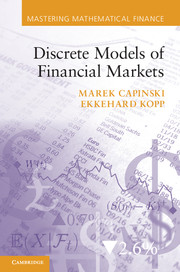4 - Multi-step general models
Published online by Cambridge University Press: 05 June 2012
Summary
Building on our experience with binomial models, we now formulate a general market model with finite sample space and finitely many discrete time steps. Beginning with a single-stock model, we review the definitions of basic concepts encountered for binomial models, such as partitions of the sample space, conditional expectations with respect to partitions or random variables, filtrations and martingales, and derive some of their properties. We then describe self-financing, predictable trading strategies and formulate the No Arbitrage Principle for general finite models. Finally, moving to a multi-stock model, the two Fundamental Theorems of Asset Pricing, describing absence of arbitrage and market completeness in terms of existence and uniqueness of the risk-neutral probabilities, are proved for finite multi-step models.
Partitions and conditioning
Assume given a finite sample space Ω = {ω1, ω2, …, ωM}, which remains fixed throughout this chapter. Fix a probability P on Ω with P({ω}) > 0 for all ω in Ω. We again write P(ω) for ease of notation. The additivity principle shows that P(A) = Σω∈AP(ω) for any A ⊂ Ω, and we insist that P(Ω) = 1. For any non-empty B ⊂ Ω, define a new probability PB(ω) = P(ω)/P(B) if ω ∈ B and 0 otherwise. Thus PB(B) = 1, and for any A ⊂ Ω, PB(A) = P(A ∩ B)/P(B). We call this the conditional probability of A given B.
- Type
- Chapter
- Information
- Discrete Models of Financial Markets , pp. 72 - 109Publisher: Cambridge University PressPrint publication year: 2012



